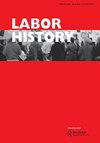马德拉斯Kraals,动物劳工和兽医军团:在英属南印度殖民野生大象
IF 0.7
4区 管理学
Q1 HISTORY
引用次数: 0
摘要
动物、动物劳动和动物资本在殖民地资本主义的发展中起着至关重要的作用。在劳动理论中,劳动动物只构成工具或资源,通过捕获、限制、繁殖和训练,肯定了人类对动物的财产权。资本主义与动物的互动从早期的战争和狩猎实践发展到后来的保护话语、法律控制和资本密集型殖民地工业中动物的商品化。这篇文章考察了殖民时期野生大象被捕获、驯服和训练成劳动动物,并作为商品出售给资本主义木材工业的复杂历史。本文运用乔纳森·萨哈(Jonathan Saha)的“不死资本”概念,阐述了野生大象是如何通过Kraal系统从被猎杀转变为由兽医保护、喂养、提供和保持健康的,最后却被商品化为工作动物的。然而,这种商品化导致了动物的征服,生态的转变,以及大象和它们的饲养者之间新的物种间关系的培养。大象看护人的知识和经验成为殖民地动物管理的核心,并被认为是殖民主义创造关于野生动物和森林的新知识的途径。本文由印度理工学院马德拉斯工业咨询和赞助研究中心(ICSR)资助的“动物护理、科学和殖民主义”探索性研究项目发展而来,印度金奈。本文的部分内容于2023年7月在约克大学举行的帝国商品国际研讨会上发表。我们要感谢ICSR、IIT马德拉斯的资助、Teresa Joshy的档案协助以及所有约克研讨会参与者的反馈。我们还要感谢本文的编辑和两位匿名审稿人。披露声明作者未报告潜在的利益冲突。关于自由主义和马克思主义关于非人类动物和劳动的思想的详细分析,见Blattner et al. (Citation2020)。动物劳动:物种间正义的新前沿?牛津大学出版社。马德拉斯政府。(Citation1887)。税收局(森林)派遣。泰米尔纳德邦金奈档案馆(以下简称TSAC)。马德拉斯政府。(1888)。税收局(森林)派遣。TSAC.4。马德拉斯政府。(1892)。税收局(森林)派遣。TSAC.5。马德拉斯政府。(1912)。税收局(森林)派遣。TSAC.6。马德拉斯政府。(1913年2月7日).税收局(森林)快讯。TSAC.7。印度政府。(1879)。1879.8年《大象保护法案》马德拉斯政府。(1885年6月20日)税收局(森林)派遣。TSAC.9。Ibid.10。哥印拜陀地区行政长官(1879年2月6日)。[给马德拉斯政府首席秘书的信]。TSAC.11。马拉巴尔区行政长官。(1900)。[给马德拉斯政府土地收入专员的信]。TSAC.12。哥印拜陀森林管理员。(1915)。[给马德拉斯政府土地收入专员的信]。TSAC.13。哥印拜陀森林管理员。(1908)。[给马德拉斯政府土地收入专员的信]。TSAC.14。比扎加巴塔南区长的代理人。(1891年12月3日)[给马德拉斯政府首席秘书的信]。TSAC.15。甘贾姆地区收集器。(1915年7月7日)[给马德拉斯政府首席秘书的信]。TSAC.16。哥印拜陀森林管理员。(1912)。[给马德拉斯政府土地收入专员的信]。TSAC.17。马德拉斯政府。(1913)。税收局(森林)派遣。TSAC.18。马德拉斯政府。(1933年3月8日).发展部快件:向私人租用大象。TSAC.19。睡椅。(引文1900,5月19日)。[给马德拉斯政府居民的信。Trivandrum喀拉拉邦档案馆(以下简称KSAT)。居民。(1900年5月27日)。[给马德拉斯政府迪万的信]。KSAT.21。马德拉斯政府。(1912年9月30日)税务委员会(森林)备忘录。TSAC.22。署理兽医署监督。(1912年7月22日)[给哥印拜陀西部森林管理员的信]。TSAC.23。马德拉斯政府。(1912年9月30日)税务委员会(森林)备忘录。TSAC.24。比萨加帕塔南总督的代理人。(1891年10月20日)。[给马德拉斯政府司法部门的电报]。TSAC.25。甘贾姆地区收集器。(1915年7月7日)[给马德拉斯政府首席秘书的信]。TSAC.26。Ibid.27。署理兽医署监督。(1912年7月22日)[给哥印拜陀西部森林管理员的信]。TSAC.28。同前。 附加信息印度理工学院马德拉斯工业咨询和赞助研究中心(ICSR)探索性研究资助计划(RF22230282HSRFER008556)贡献者说明santhosh AbrahamSanthosh Abraham是印度金奈马德拉斯印度理工学院人文与社会科学系的助理教授。他目前的研究兴趣包括动物劳动、殖民劳动和种植园、殖民法、英属印度的精神病学和殖民兽医实践。Susy Varughese是印度钦奈马德拉斯印度理工学院化学工程系的教授。除工程外,她的研究兴趣包括生态、环境、保育及自然资源管理。本文章由计算机程序翻译,如有差异,请以英文原文为准。
Madras Kraals , animal labour and Veterinary Corps: colonising wild elephants in British South India
ABSTRACTAnimals, animal labour and animal capital, were vital in developing colonial capitalism. For labour theories, working animals constituted only as tools or resources and affirmed the property rights of humans over animals by capturing, confining, breeding and training. The capitalist interactions with animals developed from the early warfare and hunting practices to the later discourses of conservation, juridical control and the commoditization of animals in the capital-intensive colonial industries. This article examines the entangled histories of wild elephants in colonial settings who were captured, tamed, and trained as working animals and sold as commodities to the capitalist timber industries. By using Jonathan Saha's conceptualization of 'undead capital', this article addresses how the wild elephants were transformed from being hunted to being protected, fed, provided for and kept healthy by veterinarians through the Kraal system only to be commoditized as working animals. However, such commoditization resulted in the subjugation of animals, the transformation of ecologies, and the fostering of new interspecies relationships between the elephants and their caretakers. The knowledge and experience of caretakers of elephants became central in colonial animal management and was perceived as a route through which colonialism created new knowledge about wild animals and the forests.KEYWORDS: Animal labourcommodificationworking animalstimber industryinterspecies relationships AcknowledgmentsThis article is developed from the Exploratory Research Project on ‘Animal Care, Science and Colonialism’, funded by the Centre for Industrial Consultancy and Sponsored Research (ICSR), IIT Madras, Chennai, India. Part of this article was presented at the International Workshop on Commodities of Empire at the University of York in July 2023. We would like to thank ICSR, IIT Madras for funding, Teresa Joshy for archival assistance and all the York workshop participants for their feedback. We also thank the editor and the two anonymous reviewers of this paper.Disclosure statementNo potential conflict of interest was reported by the author(s).Notes1. For a detailed analysis of liberal and Marxian thoughts on nonhuman animals and labour, see Blattner et al. (Citation2020). Animal labour: A new frontier of interspecies justice? Oxford University Press.2. Government of Madras. (Citation1887). Board of Revenue (Forest) Despatches. Tamil Nadu State Archives Chennai (hereafter TSAC).3. Government of Madras. (1888). Board of Revenue (Forest) Despatches. TSAC.4. Government of Madras. (1892). Board of Revenue (Forest) Despatches. TSAC.5. Government of Madras. (1912). Board of Revenue (Forest) Despatches. TSAC.6. Government of Madras. (1913, February 7). Board of Revenue (Forest) Despatches. TSAC.7. Government of India. (1879). Elephant Preservation Act 1879.8. Government of Madras. (1885, June 20). Board of Revenue (Forest) Despatches. TSAC.9. Ibid.10. District Collector of Coimbatore (1879, February 6). [Letter to Chief Secretary, Government of Madras]. TSAC.11. District Collector of Malabar. (1900). [Letter to Commissioners of Land Revenue, Government of Madras]. TSAC.12. Conservator of Forests, Coimbatore. (1915). [Letter to Commissioners of Land Revenue, Government of Madras]. TSAC.13. Conservator of Forests, Coimbatore. (1908). [Letter to Commissioners of Land Revenue, Government of Madras]. TSAC.14. Agent to the Governor of Vizagapatanam District. (1891, December 3). [Letter, to the Chief Secretary, Government of Madras]. TSAC.15. District Collector of Ganjam. (1915, July 7). [Letter to Chief Secretary, Government of Madras]. TSAC.16. Conservator of Forests, Coimbatore. (1912). [Letter to Commissioners of Land Revenue, Government of Madras]. TSAC.17. Government of Madras. (1913). Board of Revenue (Forest) Despatches. TSAC.18. Government of Madras. (1933, March 8). Development Department Despatches, Hire of Elephant to Private Parties. TSAC.19. Diwan. (Citation1900, May 19). [Letter to Resident, Government of Madras. Kerala State Archives Trivandrum (hereafter KSAT).20. Resident. (1900, May 27). [Letter to Diwan, Government of Madras]. KSAT.21. Government of Madras. (1912, September, 30). Memorandum of the Board of Revenue (Forest). TSAC.22. Acting Superintendent, Civil Veterinary Department. (1912, July 22). [Letter to the Conservator of Forests, Western Circle, Coimbatore]. TSAC.23. Government of Madras. (1912, September, 30). Memorandum of the Board of Revenue (Forest). TSAC.24. Agent to the Governor of Vizagapatanam. (1891, October 20). [Telegram to the Madras Government, Judicial Department]. TSAC.25. District Collector of Ganjam. (1915, July 7). [Letter to Chief Secretary, Government of Madras]. TSAC.26. Ibid.27. Acting Superintendent, Civil Veterinary Department. (1912, July 22). [Letter to the Conservator of Forests, Western Circle, Coimbatore]. TSAC.28. Ibid.Additional informationFundingExploratory Research Scheme, Centre for Industrial Consultancy and Sponsored Research (ICSR), Indian Institute of Technology Madras, Chennai, India (RF22230282HSRFER008556)Notes on contributorsSanthosh AbrahamSanthosh Abraham is an Assistant Professor in the Department of Humanities and Social Sciences, Indian Institute of Technology Madras, Chennai, India. His current research interests include animal labour, colonial labour and plantations, colonial law, psychiatry in British India, and colonial veterinary medical practices.Susy VarugheseSusy Varughese is a Professor in the Department of Chemical Engineering, Indian Institute of Technology Madras, Chennai, India. Apart from engineering, her research interests include ecology, environment, conservation and natural resource management.
求助全文
通过发布文献求助,成功后即可免费获取论文全文。
去求助
来源期刊

Labor History
Multiple-
CiteScore
1.00
自引率
28.60%
发文量
44
期刊介绍:
Labor History is the pre-eminent journal for historical scholarship on labor. It is thoroughly ecumenical in its approach and showcases the work of labor historians, industrial relations scholars, labor economists, political scientists, sociologists, social movement theorists, business scholars and all others who write about labor issues. Labor History is also committed to geographical and chronological breadth. It publishes work on labor in the US and all other areas of the world. It is concerned with questions of labor in every time period, from the eighteenth century to contemporary events. Labor History provides a forum for all labor scholars, thus helping to bind together a large but fragmented area of study. By embracing all disciplines, time frames and locales, Labor History is the flagship journal of the entire field. All research articles published in the journal have undergone rigorous peer review, based on initial editor screening and refereeing by at least two anonymous referees.
 求助内容:
求助内容: 应助结果提醒方式:
应助结果提醒方式:


